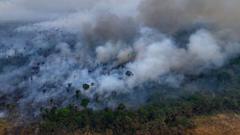A recent analysis unveiled that the rate of tropical forest destruction reached an unprecedented high last year, raising urgent alarms about their role in mitigating climate change.
Tropical Forests Face Unprecedented Destruction as Deforestation Surges

Tropical Forests Face Unprecedented Destruction as Deforestation Surges
New satellite data reveals alarming rates of tropical forest deforestation, prompting climate concerns.
The world's tropical forests, which play a critical role in combating climate change, experienced the fastest recorded deforestation rate last year, according to new satellite data analysis. An estimated 67,000 square kilometers (about 26,000 square miles) of these vital ecosystems were lost in 2024, an area comparable to the size of the Republic of Ireland, translating to approximately 18 football pitches disappearing each minute.
Fires emerged as the predominant cause of this destruction, surpassing agricultural land clearances for the first time on record. The Amazon rainforest, significantly affected by severe drought conditions, witnessed particularly extensive damage. Despite the grim news, Southeast Asia displayed a more positive trend, where government interventions contributed to reduced forest loss.
Tropical rainforests are known to store massive quantities of carbon in their soils and trees, yet this alarming record of deforestation raises questions about their future resilience as global temperatures rise. Researchers warn that certain regions, particularly parts of the Amazon, may be nearing a "tipping point," beyond which they could suffer irreversible decline. Professor Matthew Hansen, co-director of the GLAD laboratory at the University of Maryland, described the situation as "frightening," expressing concerns about potential shifts toward a savanna ecosystem as old-growth forests decline.
A separate study echoed these warnings, suggesting that significant dieback in the Amazon could occur if global warming surpasses the international target of 1.5 degrees Celsius. This situation poses not only a threat to the diverse wildlife residing in these biodiverse regions but also has grave implications for global climate health.
Historically, the Amazon has acted as a carbon sink, absorbing more carbon dioxide than it emits. However, during the last year, the fires fueled by drought released more than 3.1 billion tonnes of carbon emissions, equivalent to the total greenhouse gas emissions of the European Union. The ongoing climate crisis exacerbated by the El Niño weather pattern, along with deliberate land-clearing fires, makes the challenge of moderating forest destruction increasingly complex, according to experts at the World Resources Institute (WRI).
Amidst these alarming trends, there are signs of progress in Southeast Asia. Indonesia's primary forest loss dropped by 11% in 2024, attributed to successful government measures and community involvement in enforcing "no burning" policies. This serves as a potential model for other countries grappling with forest loss, indicating that sustained political will is essential for effective environmental protections.
As global leaders prepare for the upcoming UN climate summit COP30 to be held in the Amazon, experts emphasize the importance of discussing and promoting forest protection initiatives. One innovative proposal is to incentivize countries for maintaining their tropical forests, which underscores a fundamental shift in addressing the ongoing dilemma of deforestation-driven economic incentives.
In conclusion, while the global statistics raise serious concerns about tropical forest loss, the positive trends observed in specific regions provide hope and guidelines for effective conservation efforts moving forward.
Fires emerged as the predominant cause of this destruction, surpassing agricultural land clearances for the first time on record. The Amazon rainforest, significantly affected by severe drought conditions, witnessed particularly extensive damage. Despite the grim news, Southeast Asia displayed a more positive trend, where government interventions contributed to reduced forest loss.
Tropical rainforests are known to store massive quantities of carbon in their soils and trees, yet this alarming record of deforestation raises questions about their future resilience as global temperatures rise. Researchers warn that certain regions, particularly parts of the Amazon, may be nearing a "tipping point," beyond which they could suffer irreversible decline. Professor Matthew Hansen, co-director of the GLAD laboratory at the University of Maryland, described the situation as "frightening," expressing concerns about potential shifts toward a savanna ecosystem as old-growth forests decline.
A separate study echoed these warnings, suggesting that significant dieback in the Amazon could occur if global warming surpasses the international target of 1.5 degrees Celsius. This situation poses not only a threat to the diverse wildlife residing in these biodiverse regions but also has grave implications for global climate health.
Historically, the Amazon has acted as a carbon sink, absorbing more carbon dioxide than it emits. However, during the last year, the fires fueled by drought released more than 3.1 billion tonnes of carbon emissions, equivalent to the total greenhouse gas emissions of the European Union. The ongoing climate crisis exacerbated by the El Niño weather pattern, along with deliberate land-clearing fires, makes the challenge of moderating forest destruction increasingly complex, according to experts at the World Resources Institute (WRI).
Amidst these alarming trends, there are signs of progress in Southeast Asia. Indonesia's primary forest loss dropped by 11% in 2024, attributed to successful government measures and community involvement in enforcing "no burning" policies. This serves as a potential model for other countries grappling with forest loss, indicating that sustained political will is essential for effective environmental protections.
As global leaders prepare for the upcoming UN climate summit COP30 to be held in the Amazon, experts emphasize the importance of discussing and promoting forest protection initiatives. One innovative proposal is to incentivize countries for maintaining their tropical forests, which underscores a fundamental shift in addressing the ongoing dilemma of deforestation-driven economic incentives.
In conclusion, while the global statistics raise serious concerns about tropical forest loss, the positive trends observed in specific regions provide hope and guidelines for effective conservation efforts moving forward.





















